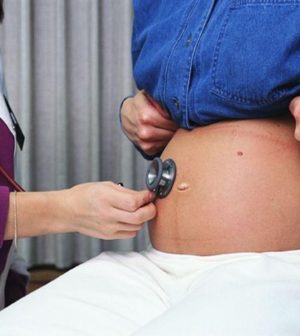- U.S. Births Declined in 2023, Marking End to Post-Pandemic Rise
- FDA Approves New Antibiotic Against UTIs
- New School Lunch Rules Target Added Sugars, Salt
- Dairy Cows Moved Across State Lines Must Now Be Tested for Bird Flu
- TikTok Riddled With Misleading Info on Health: Study
- Emulsifier Chemicals Are Everywhere in Foods. Could They Raise Diabetes Risk?
- Opioids During Pregnancy May Not Raise Psychiatric Risks for Offspring
- Could Heartburn Meds Raise Your Migraine Risk?
- Drug, Alcohol Abuse Goes Untreated in Many Ex-Prisoners
- Watchdog Group Says U.S. Food Recalls Rose Again Last Year
Mom-to-Be’s ‘Leaky’ Heart Valves May Pose More Danger Than Thought

Leaky heart valves can put pregnant women at serious risk, according to a large study that runs counter to established practice.
The condition used to be considered relatively harmless during pregnancy. But this analysis by Johns Hopkins University researchers of more than 20,000 individual medical records reveals that heart valve disease puts women at risk for bleeding, high blood pressure, organ damage and other complications during childbirth.
“Our study focused on something that perhaps doesn’t get a lot of attention,” senior author Dr. Erin Michos said in a Hopkins news release. She directs women’s cardiovascular health and is an associate professor at the university’s School of Medicine in Baltimore.
Michos said the new findings call for increased screening of all types of valve disease before and during pregnancy.
Four valves in the heart keep blood flowing in the right direction. In regurgitant heart valve disease, a valve doesn’t close completely, causing leakage and backward blood flow.
Existing guidelines for gauging risk have focused on narrowed valves, which can reduce blood flow and strain the heart.
Based on their findings, however, researchers said pregnant women with regurgitant or leaky valve disease are just as likely to have complications such as fluid buildup in the lungs, abnormal heart rhythm or heart failure.
The study relied on a large database of U.S. hospital admissions between 2016 and 2018. From 11.2 million delivery hospitalizations, just over 20,300 women had a documented history of valve disease.
The analysis found that pregnant women with a history of regurgitant or narrowed valves were up to 100 times more likely to experience complications such as heart failure during delivery compared with other women.
Most women with valve disease were older and had underlying conditions such as high blood pressure or diabetes, researchers said.
Preeclampsia, a dangerous pregnancy complication caused by high blood pressure, was 90% more common among women with valve disease, and hemorrhage during delivery was 40% more likely. Placental abruption, a detachment of the placement resulting in poor oxygen flow to the baby, was 30% more common.
“Unfortunately, so much of women’s health practices has been dominated by individual experiences and experts saying they believe something to be true rather than based on evidence,” said lead author Dr. Anum Minhas, chief clinical and research fellow in the Division of Cardiology at Johns Hopkins Medicine.
Minhas said the research was an outgrowth of experiences with women who have a history of severe valve disease as well as a lack of current research on the value of assessment tools.
Heart valve disease causes complications such as premature labor and heart failure in up to 10% of women giving birth each year.
Women with any form of heart disease may benefit from specialized care from a cardio-obstetric team, Michos said. Risk calculators should be revised, the authors suggested.
“The data tell us that we really can’t assume that women who have leakier heart valves are going to be OK during pregnancy,” Minhas said in the release. “They should get the same amount of attention that women with [narrowed] valves get.”
The findings were recently published online in the American Journal of Cardiology.
More information
The U.S. Centers for Disease Control and Prevention has more on pregnancy complications.
SOURCE: Johns Hopkins Medicine, news release, Sept. 2, 2021
Source: HealthDay
Copyright © 2024 HealthDay. All rights reserved.










